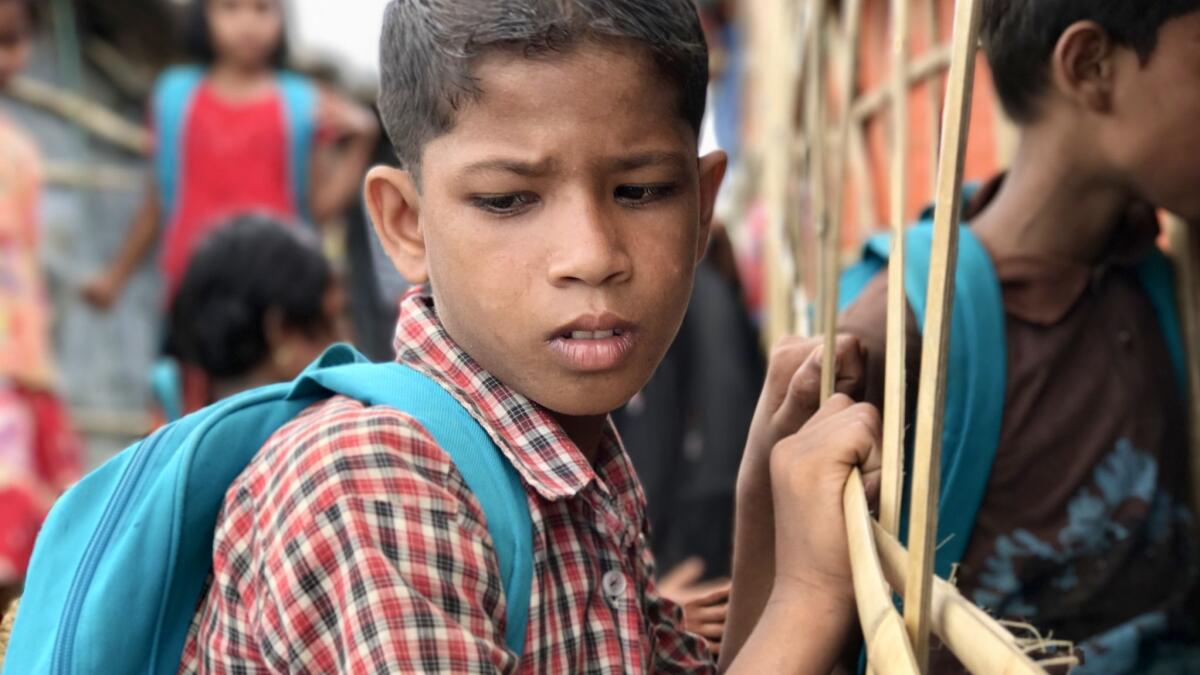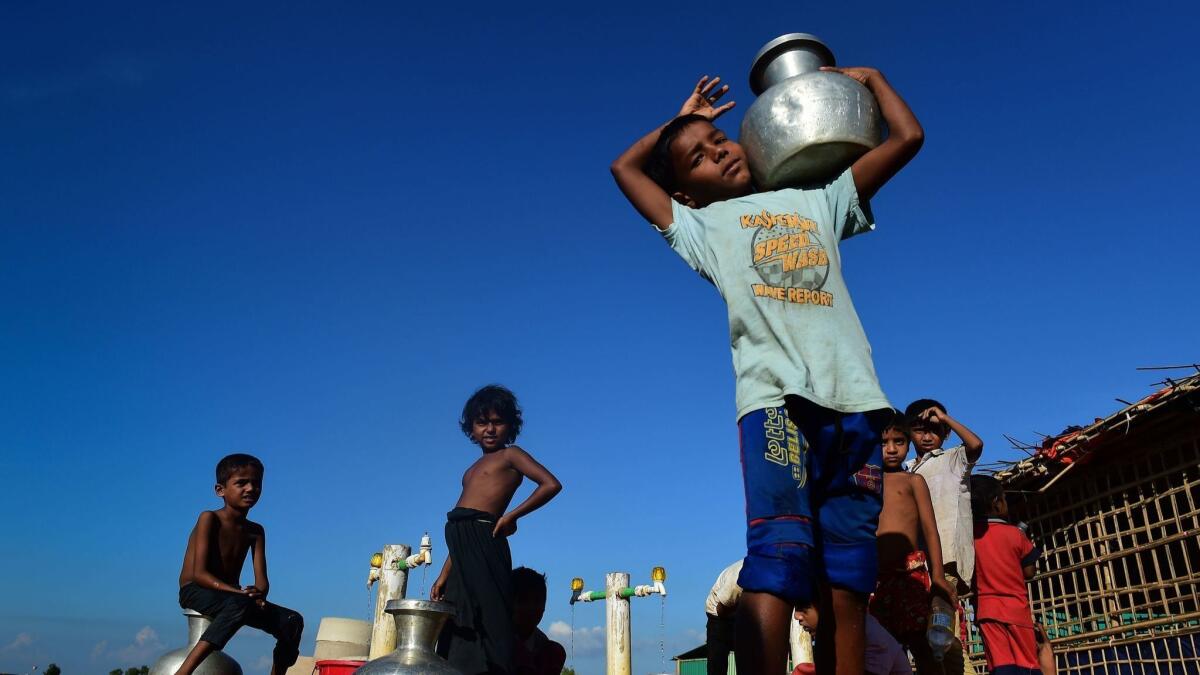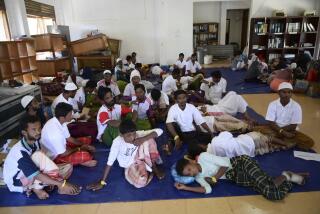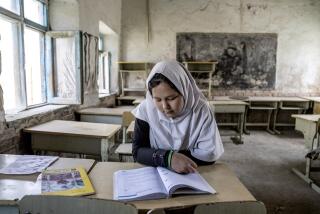Thousands of Rohingya children in the world’s largest refugee settlement are going without an education

Ibrahim Mohammad, a slight 10-year-old with a guarded manner, used to love school. But as a fourth-grader in 2017, he saw his parents’ house burned down by the Myanmar military, his grandfather shot and killed, and his mother forced to deliver a baby in the forest as his family fled along with hundreds of thousands of other Rohingya Muslims to Bangladesh.
Ibrahim, who used to dream of becoming a doctor, is now prone to long silences and mood swings, and he rarely smiles.
“It changed him,” said his father, Mohammad Eleyas. And “not having a school has made things worse.”
It’s been 16 months since a brutal Myanmar military operation left thousands of Rohingya Muslims dead and sent at least 800,000 fleeing over the border to Bangladesh. Now, in what has become the world’s largest refugee settlement, half a million children are in need of a formal education, which an international relief effort is failing to provide.
What’s more, some question whether aid agencies vying for funds are as interested in looking good to potential donors as in providing a basic education to the children they say they are serving.
Rohingya families and Bangladeshi officials sharply criticize the United Nations-backed humanitarian operation — which has received $655 million in international aid over the last year — for providing inadequate classrooms and curriculum. The needs are particularly great, they say, because most refugees have little hope of returning to Myanmar anytime soon.
Many Rohingya Muslim children in predominantly Buddhist Myanmar were already denied an education after a crackdown begun in 2012. Government schools that were teaching Rohingya children in the Burmese language quickly shut down after the Myanmar army offensive began in August 2017.
Critics say the makeshift learning centers — operating out of temporary bamboo structures slightly larger than huts — established by the U.N. Children’s Fund, or UNICEF, and its partner agencies are little more than play areas where children are taught songs and rhymes, often in English, with little emphasis on the reading, writing and other skills many were taught in regular schools back in Myanmar before the violence.
Many parents say they are frustrated to see children being trained to recite songs such as “We Shall Overcome” for foreign visitors and dismiss the facilities as a waste of time. Many children simply stop going.
The few families who can afford it are spending what little cash they have on private tutors to ensure their children learn.
“They teach our children the same rhymes over and over again,” Eleyas said. “Ibrahim gets bored and doesn’t want to go to school anymore.”
The anger came to a boil in December, when officials from Bangladesh’s Refugee Relief and Rehabilitation Commission — the government agency overseeing the humanitarian response — accused UNICEF and 10 of its partner agencies of incorrectly reporting the numbers of children attending learning centers, as well as engaging in other questionable practices.
The commission said it had found that aid agencies were not tracking the numbers of children who had stopped attending the learning centers, resulting in vastly inflated enrollment numbers that they used to appeal for more donor funding, according to minutes of the meeting obtained by The Times.
The commission also received reports that some agencies were opening new centers alongside existing ones run by other groups even though the additional facilities were not needed in those locations. They did so, the commission found, to “poach” children and increase their headcount to help with donor funding appeals.
Although the commission did not single out individual agencies for wrongdoing, 10 international and Bangladeshi groups were summoned for a meeting.
Two Bangladeshi officials on the commission, Shamimul Huq Pavel and A.S.M. Obaidullah, said UNICEF and its partners did not consult with the Bangladeshi government on its strategies and ignored repeated requests for better communication, according to the minutes, which officials confirmed were accurate.
“Bangladesh is not a conflict zone like Yemen or Syria,” Pavel said, “where partners can act without approval from local government.”
UNICEF spokesman Jean-Jacques Simon acknowledged that there had been “communication gaps.” He said officials responsible for education would soon work out of the local government primary education office in Cox’s Bazar, the nearest city, to improve contact with Bangladeshi authorities.
Simon said UNICEF had agreed to amend the data on enrollment at learning centers to account for children who stopped coming.
He added that reports of “land grabbing” — setting up learning centers without approval from camp authorities — were an outgrowth of crowding in the camps, where more than 100 agencies are providing relief.
“The scarcity of the land available in the camp is a challenge for all agencies working on the humanitarian response,” Simon said. “However, despite the challenges, UNICEF is fully committed to providing education to Rohingya children.”
The head of the Bangladeshi commission, Mohammad Abul Kalam, said turf battles between aid agencies were not limited to the education sector.
“It is unfortunate that competition arises between humanitarian actors,” Kalam said in an email, “considering the high needs, insufficient financial and human resources, and the extreme scarcity of land which characterizes this response.”
UNICEF has warned of a “lost generation” of Rohingya children, who constitute 60% of the camps’ population. They are visible everywhere, collecting firewood, helping parents with household work, taking whatever odd jobs are available — but often simply playing by the dirt roads.

As of July, about 1,200 learning centers were operating in the camps, and nearly 140,000 children had been enrolled.
In these facilities, Bangladeshi instructors teach children rhymes, dances and proper hygiene. There are often donated toys and a place for younger children to nap during the day. But most classrooms lack stationery, notebooks or drinking water.
Parents say the informal schooling targets younger children and does not include reading, math or other basic subjects. According to the most recent UNICEF data, 39% of children ages 4 to 14 don’t even attend the learning centers. That figure is 97% for children 15 to 18, a group that UNICEF has warned is at risk of sexual trafficking by criminal groups or other forms of exploitation.
In Buthidaung township in northern Rakhine state, where Eleyas grew up, most teachers were Buddhists and stopped coming to Rohingya schools in the months leading up to the Myanmar army offensive.
“When we were children, we did not have a chance at education in Myanmar. Now, our children are being robbed of this opportunity,” said Muhib Ullah, a community leader who heads the Arakan Rohingya Society for Peace and Human Rights, an activist organization in the camps. “Our community’s future depends on these children having a right to education. When the learning centers were opened, we were happy. But we realize our children learn nothing there. It’s been over a year — how are the schools not working yet?”
Frederic Vincent, who leads education activities in the camps for UNICEF, said aid agencies were finalizing a formal curriculum in Burmese, including all major subjects, that would be rolled out to learning centers this year to provide “more structured, quality education opportunities” for Rohingya children.
Rohingya families who earn money in the camps by doing odd jobs are now paying as much as $70 a month for private lessons in math, science and English for their children. Educated Rohingya refugees tutor students using Burmese textbooks brought in through informal networks, at religious schools and in families’ temporary shelters.
Eleyas earned a master’s degree in geography from Sittwe University in the Rakhine state capital, the only college Rohingya Muslims were able to attend due to travel restrictions. He has hired tutors to teach Ibrahim history.
“It is critical for my community to teach our children about what was done to us,” the father said. “We cannot prepare them for the future if they don’t know our past.”
Krishnan is a special correspondent.
More to Read
Start your day right
Sign up for Essential California for news, features and recommendations from the L.A. Times and beyond in your inbox six days a week.
You may occasionally receive promotional content from the Los Angeles Times.






